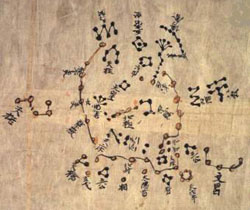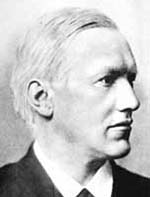Approaching History
InscenationGetting rid of one's own desires and leaving nothing in their place, a technique mentioned on the Bias page, is perilous because desire abhors a vacuum:
When the unclean spirit has gone out of a man, it passes through waterless places seeking rest, but it finds none. Then it says, "I will return to my house that I came from." And when it comes, it finds the place empty, swept, and put in order. Then it goes out and brings back with it seven other spirits more evil than itself, and they come in and take up residence there, and the last state of that man is worse than the first. (Matthew 12:43-50).
The obvious solution is to fill the space with something better. And the obvious better thing is a more appropriate expectation.
People sometimes imagine that their task of acquaintance with a culture is finished when they have learned the words in the dictionary of that culture. But we also need to know what the words referred to: how things worked, what was outside the window. We need to know, not just the facts of antiquity, but the reflexes of antiquity. I once remarked to a class that people in ancient China had a different horizon: they knew no Caesar or Cleopatra, and when they looked up at the sky, they saw different constellations there. One student (Jeremy, sitting in the right corner at the back) told me years later that this remark "blew his mind." Well it might. It was meant to. It is the mind of the present that we need to get rid of, and it is the mind of the past that we need to replace it with, so we won't forever go groping through antiquity, trying to open doors that aren't there, tripping over thresholds that are there, making the wrong moves at dinner, citing the wrong precedents at court, and lousing up generally.
Other times and other places need to be understood on their own terms, not on ours. Acquiring the mental equipment of some writer, adjusting to his mental horizon, is the precondition for making sense of his text. You can't do it by importing your own mental equipment. This principle was embodied in a single German word, coined by Assyriologist Benno Landsberger in his inaugural lecture at Leipzig in 1924. The word is Eigenbegrifflichkeit. We won't attempt to translate it (the Germans can get more into a noun than anybody else can get into a sentence), but it means something like "the quality of being intelligible on its own terms." The following might be an illustration of the concept in practice.
You are reading an essay by a Renaissance courtier. You know Italian; you have calibrated to Renaissance Italian. Are you finished? Not likely. What classical allusions is the writer making? How's your Vergil, not to mention your Dante? How much of the argument of your document resides in appeals to things that are not on the page, precisely because everybody at the time knew them, and it would have been gauche to mention them? What perils of the present are implied by the existence of the essay, perils which it might have been inexpedient to name directly, but which may be shaping the terms of the discussion? What contemporary medical theories, what recent legal precedents, what popular tales, are part of the common mental furniture of writer and readers? Is there an argument from finance, and how was finance conceived of by those who were then in charge of it? What did their mental spreadsheet look like, what were the terms of their internal calculations of profit and loss? Who is the writer addressing? His contemporaries in general? The ruler of his state? The ruler of an opposing state, whose patronage he hopes to attract? Posterity, you and me, for ultimate vindication in a course for which there is no hope of immediate success? All these and other possibilities occur. But they only exist for you if you can recognize them.
Every Tang Chinese official, as part of basic literacy, knew the Six Dynasties anthology Wvn Sywaen by heart. If you are a student of Tang China, are you, by that standard, literate in the culture you are studying? To understand a writer, you have to know what that writer knew. You have to educate yourself for success in a world long gone, a world in which your own success is limited to a spectator role: knowing what these people are talking about, or doing, or mistakenly attempting to do.
We may call this process of substitutive acquaintance "inscenation," - feeling yourself into the scene. One does this by contact, and contact is chiefly through reading. This is the deep meaning of the remark made by Wilamowitz-Moellendorff, as he bounded briskly downstairs early one morning to greet a young visitor, and without any preliminary courtesies at all, asked him:
What are you reading?
The answer should be, Everything.
It takes time; time in unconscionable quantities. That is the chief reason why history, unlike music or mathematics, has no prodigies. It takes too long to internalize the material to think about, and to habituate oneself to the way the people of that time thought about it. It requires cumulation. But however long the time, it will be shorter tomorrow if you start today.
By all means renew your subscription to The Economist (so as not to run afoul of Hamerton p378). Keep your driver's license current. Wash your hair once in a while. Don't wholly fade out at the near end. But for one who hopes to understand antiquity, the far end is where it's at.
17 Mar 2006 / Contact The Project / Exit to Outline Index Page


